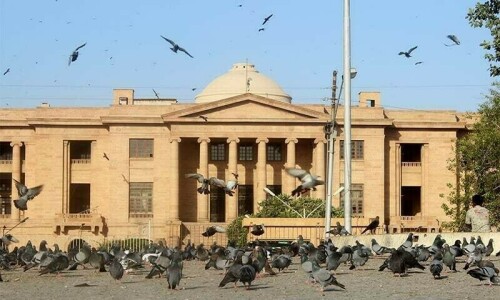
PARIS: Humanity is squandering the natural capital that has allowed society to thrive, driving a million species to the brink of extinction in the process, a landmark UN report on the state of Nature warned on Monday.
Relentless plundering and poisoning of Earth’s bounty — water, wildlife, air, soil and forests — threatens societies “at least as much as climate change,” said Robert Watson, who chaired the 132-nation meeting that validated a Summary for Policymakers forged by 450 experts.
“We are eroding the very foundations of our economies, livelihoods, food security, health and quality-of-life worldwide,” said Watson. “We really need to get governments to think beyond GDP.” “It is like using the goose that lays golden eggs to make soup,” said co-chair Eduardo Brondizio, a professor of Anthropology at Indiana University Bloomington.
The accelerating pace of extinction — ten to hundreds of times faster than over the last 10 million years — could tip Earth into the first mass extinction since non-avian dinosaurs died out 66 million years ago.
Read: 1 million species risk extinction due to humans: draft UN report
Halting and reversing these dire trends will require “transformative change” — a sweeping overhaul of the way we produce and consume almost everything, especially food, the report concluded. Watson said pushback from vested interests is likely to be fierce.
“A lot of actors in the fossil fuel industry and agriculture sector would not want to see energy, transportation or agriculture subsidies reduced,” he said.
“But these are the hard decisions that governments need to take.” Drawing from 15,000 sources and an underlying 1,800-page report, the executive summary details how our growing footprint and appetites have compromised the natural renewal of resources that sustain civilisation, starting with fresh water, breathable air, and productive soil.
An October report from the UN’s climate science panel painted a similarly dire picture for global warming, and likewise highlighted the need for social transformation “on an unprecedented scale” to cap the rise in temperature at 1.5 degrees Celsius (2.7 Fahrenheit).
Climate change and biodiversity loss, it turns out, feed off each other in a vicious cycle.
Deforestation and industrial agriculture are major drivers of species and ecosystem decline, but also account for at least a quarter of man-made greenhouse gas emissions.
Global warming, in turn, is pushing thousands of animals and plants out of their comfort zones, and intensifies the kind of heatwaves and droughts that recently fuelled unprecedented fires in Australia, Indonesia, Russia, Portugal, California and Greece.
The overlapping drivers of global warming and biodiversity loss point to shared solutions, but there is potential for policy conflict too, the new report cautioned.
Plans to green the global economy reserve a crucial role for burning biofuels and locking away the CO2 released, a technology known as BECCS.
But the huge tracts of land needed to grow energy crops on this scale — roughly twice the size of India — would clash with the expansion of protected areas and reforestation efforts, not to mention food production.
Published in Dawn, May 7th, 2019














































Dear visitor, the comments section is undergoing an overhaul and will return soon.